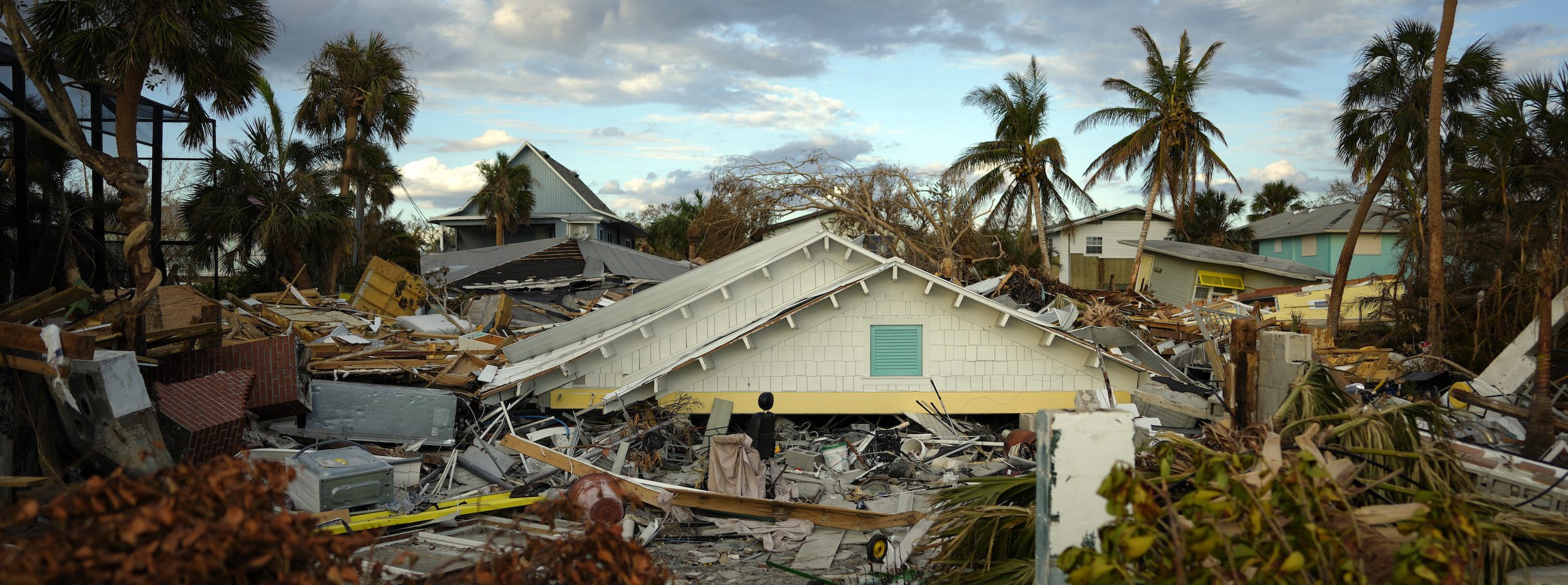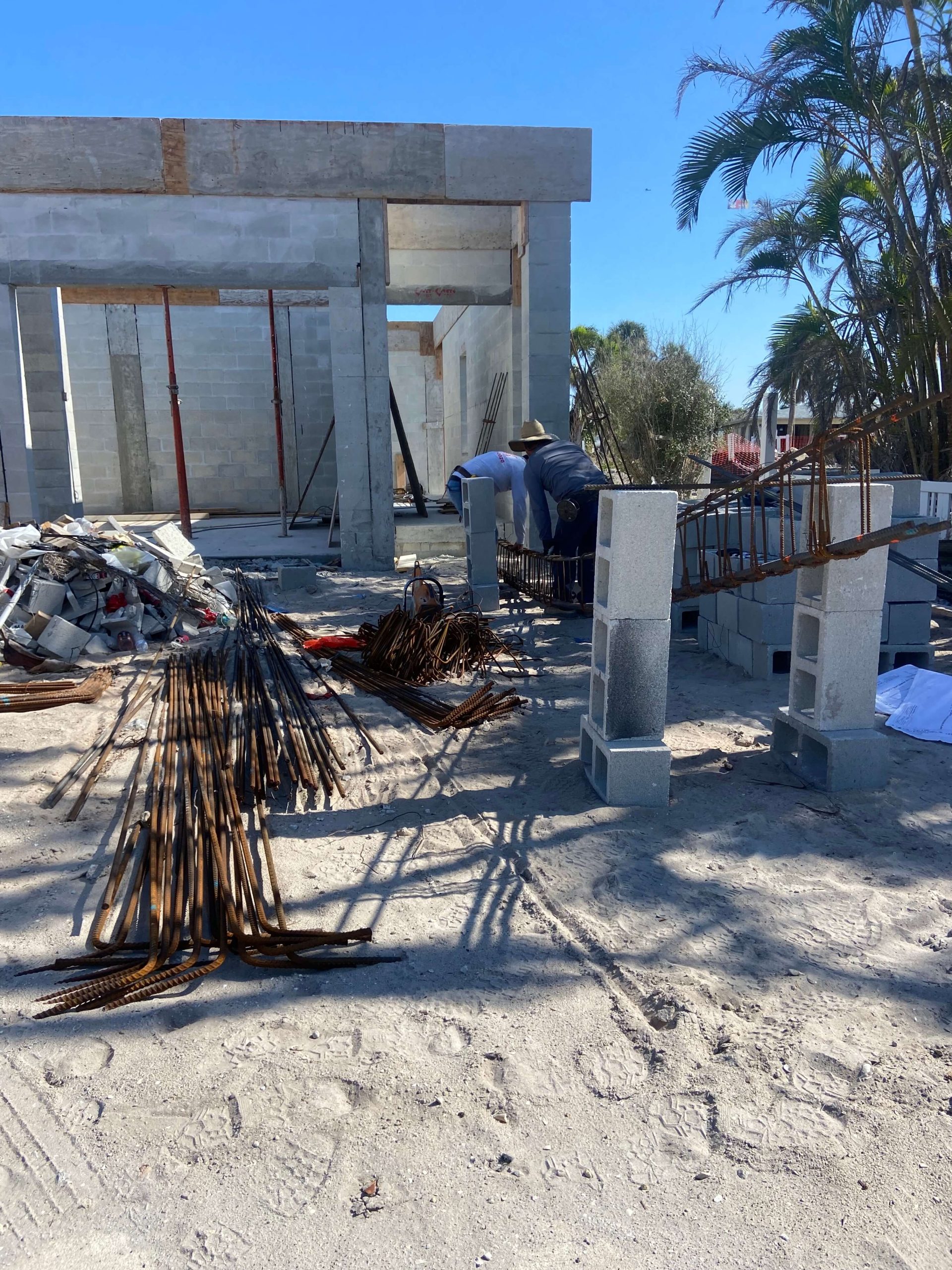
Government, Immigration
Florida’s anti-immigration law targets disaster relief workers
Many disaster restoration workers like Fredy, who drive to disaster sites together in small teams, could be charged with a third-degree felony. These workers avoid going to hospitals out of fear.
This article was produced in partnership with Columbia Journalism Investigations and the Center for Public Integrity. It was co-published by Futuro Investigates, a division of Futuro Media.
Hurricane Ian’s raging winds and nearly 13-foot storm tide moved like a “slow tsunami” as it overtook Sanibel Island, destroying everything in its wake. The worst storm in a century washed away sections of the three-mile causeway that connects this mostly wealthy community to Southwest Florida.
But in less than a month and ahead of schedule, Florida Gov. Ron DeSantis, a Republican, re-opened the Sanibel Causeway. DeSantis said it was important to get trucks and workers inside the island to start rebuilding.
“It is going to require a lot of manpower … a lot of effort,” DeSantis said at a press conference a few weeks after the storm.
Fredy, an undocumented immigrant from Honduras, and his team became part of that manpower. They drove to Florida joining scores of immigrants looking for work after Hurricane Ian. Fredy spent the two months in Sanibel Island clearing debris, demolishing and rebuilding 18 apartments.

Disaster restoration workers rebuild a home located in Sanibel Island without protective gear in March 2023. Hurricane Ian destroyed the wealthy island. (María Inés Zamudio / Center for Public Integrity)
Columbia Journalism Investigations and the Center for Public Integrity are not publishing the full names of Fredy and other workers to protect them from potential retaliation.
Disaster restoration workers like Fredy are part of a growing, vital and loosely regulated industry of restoration workers who toil in the devastation of hurricanes, floods and wildfires. An investigation by CJI and Public Integrity found that many disaster-restoration workers are exposed to known carcinogens and various toxins, often unwittingly and without protections, which can make them sick. Some suffer debilitating health issues long after they’ve left cleanup jobs. Many are unknowingly exposed to dangerous toxins when they work to help rebuild Floridian communities.
After Fredy drove his Ford Escape with three friends to Fort Myers, he purchased masks, gloves and other safety equipment. But Ian was his fifth storm and, by then, Fredy said he was well aware that employers are not likely to provide protective gear. The men slept in the SUV the first few weeks and later secured a trailer. When things started settling in for these workers, Gov. DeSantis signed the nation’s strictest state immigration law.
SB 1718, which took effect on July 1, 2023, criminalizes “persons who knowingly and willfully violate, or who reasonably should know and violate, certain provisions relating to the transporting into [Florida]” of illegal immigrants. Workers like Fredy, who drive to disaster sites together in small teams, could be charged with a third-degree felony. He said this Florida law feels unfair because he’s a builder and not a criminal.
Fredy said he contemplated leaving Florida but decided to stay for the promise of work from Hurricane Ian and the work to come from this year’s hurricane season.
“Where can we go if the work is here?” Fredy said in Spanish. “There are many of us here.”
Meanwhile, another hurricane season is here. In late August, Idalia, a Category 3 hurricane, made landfall in Northwest Florida leaving floods and destruction.
This year, the National Oceanic and Atmospheric Administration is forecasting a range of 12 to 17 total named storms – between five and nine could become hurricanes, according to NOAA’s outlook for the 2023 Atlantic hurricane season, which started in June and ends in November.
The CJI and Public Integrity investigation found OSHA’s lenient workplace safety policy post natural disaster, rolled out after Hurricane Katrina, leaves workers vulnerable to abuse while companies skirt regulations without the likelihood of penalty.
As climate change causes more frequent natural disasters, the disaster restoration industry has rapidly expanded, capitalizing on the labor from undocumented immigrants. These workers perform the most arduous tasks after hurricanes, floods and wildfires — tasks that expose them to harmful toxins. And they face many challenges and little protection. Florida’s new immigration law would punish them too, workers say.
“[DeSantis] is exploiting an already really fragile situation,” said Shannon Gleeson, professor at Cornell’s School of Industrial and Labor Relations. Gleeson said undocumented workers already face many challenges since they are “misclassified” as independent contractors and lack access to workplace protections.
The law also has a “chilling effect” on workers who will avoid emergency rooms and other services out of fear.
In August, Fredy’s friend and coworker, Mauricio, was too sick to work. Fredy drove him to New Orleans for medical treatment in August because hospitals in Florida request legal documentation, including proof of citizenship, before a patient is admitted to a hospital for medical care.
Advocates say restoration workers are essential to clean up efforts after disasters and they deserve protection.
The Climate Resilience Workforce Act would create a “certified climate resilience worker status” for qualifying immigrants. Workers would be eligible to become legal permanent residents about 18 months after they qualified. U.S. Rep. Pramila Jayapal, D-Wash., re-introduced the bill on Wednesday. There are 40 co-sponsors for the bill, which was originally introduced in January 2022.
“Currently incarcerated individuals and undocumented immigrants play a critical but unfortunately unrecognized role right now in supporting climate resilience from fighting wildfires to helping communities prepare for and recover from climate disasters,” U.S. Rep. Jayapal said while standing with advocates outside the Capitol before she reintroduced the bill. “And yet despite this critical role, they face significant barriers to employment and threats to their health and safety.”
Thus far, only one member of the Florida delegation has supported it, Rep. Kathy Castor, a Democrat.
Fredy said if the bill in Congress is approved, it could change his life. CJI and Public Integrity asked 100 restoration workers, primarily based in Florida and Louisiana, about their experiences toiling after natural disasters. Nearly 80% of the workers reported experiencing wage theft at least once.
“Painfully, sometimes, the people [and companies] who hired us disappear after we are done,” he said. “And we don’t even know if they are real because they disappear with our money.”
Having a valid driver’s license, Fredy said, would make things easier. In 2019, when he was working in Panama City after Hurricane Michael, he and his friend were arrested for driving without a driver’s license. Fredy said he had to come up with $1,000 — a significant amount for a worker without stable housing — to get him out of jail.
In May, the League of United Latin American Citizens (LULAC), the country’s oldest and largest Latino civil rights organization, issued a travel advisory after DeSantis signed the bill, warning Florida is a “dangerous, hostile environment.”
But Fredy knows the state needs workers like him. He’s worked on at least 75 houses — including 15 homes by which the 44-year-old Honduran worker donated his labor to needy families, he said.
“Hispanic workers face a lot of risks,” Fredy said. “We do the hardest work. We are the first ones to arrive [after a hurricane] offering our labor, our hands, our strength and our health.”


